Learnings from EthCC[6]: Ethereum’s Governance Conundrum
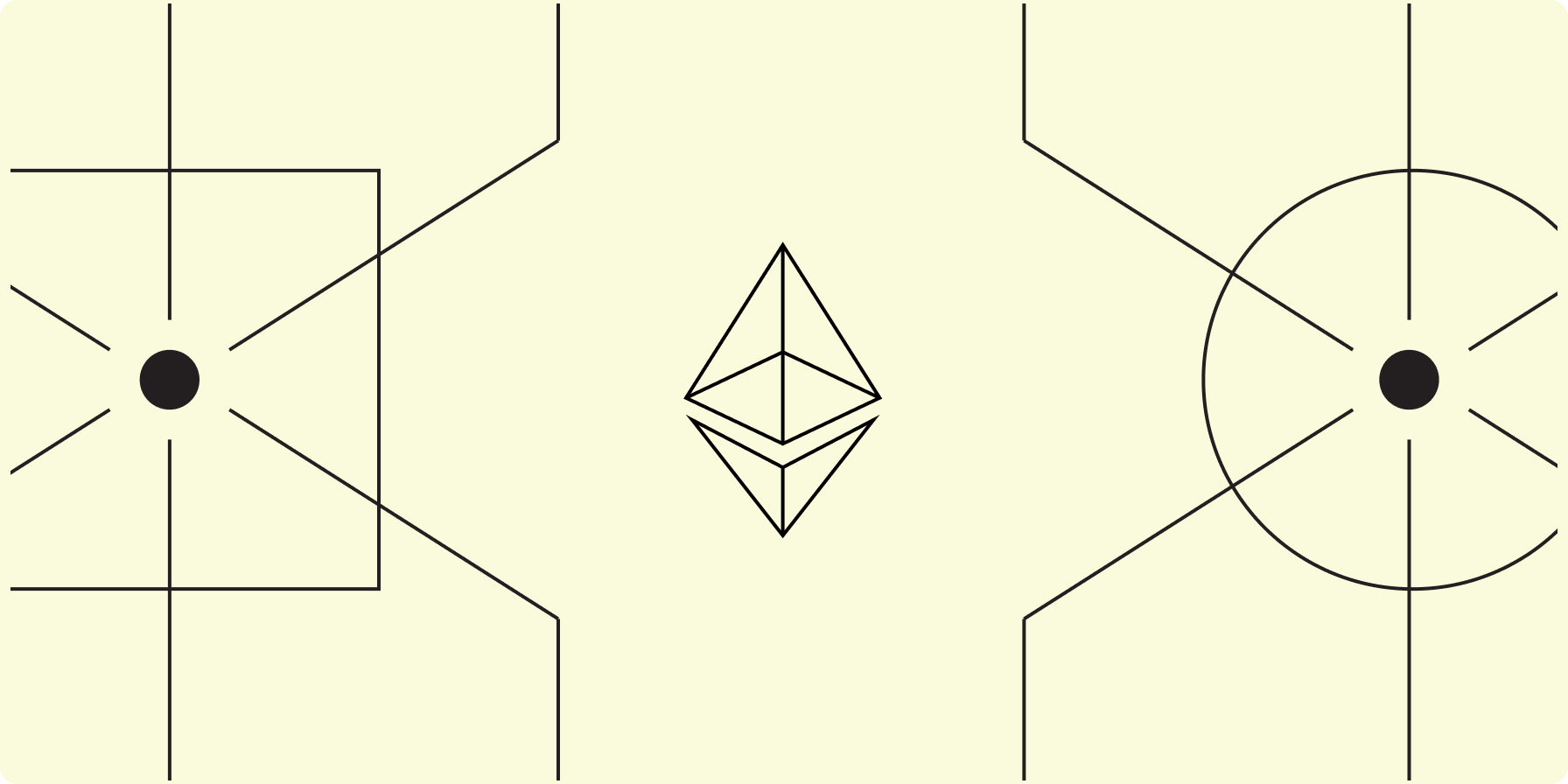
Galaxy Research’s Christine Kim attends EthCC[6], the largest annual Ethereum-focused conference in Europe. For the first time, the EthCC conference was extended three to four days. The week attracted more than 5,000 attendees and 350 speakers. In this note, Christine summarizes the main themes and highlights from EthCC[6].
The Stars Align
This year was my first time attending EthCC. As someone who has been covering Ethereum since 2018, first as a reporter at CoinDesk and now as a researcher at Galaxy, I am slightly ashamed to admit that I have never attended the largest Ethereum conference hosted in Europe before this year. In my defense, it was not for lack of trying. Be it a raging global pandemic or simply poor timing, the stars did not align for me to make the trek to Paris until 2023.
Jerome De Tychey, President of Ethereum France, humorously remarked in his opening address that the conference in prior years had to overcome certain “challenges” such as the COVID-19 pandemic in 2020 and record-breaking heat waves across Europe in 2022.
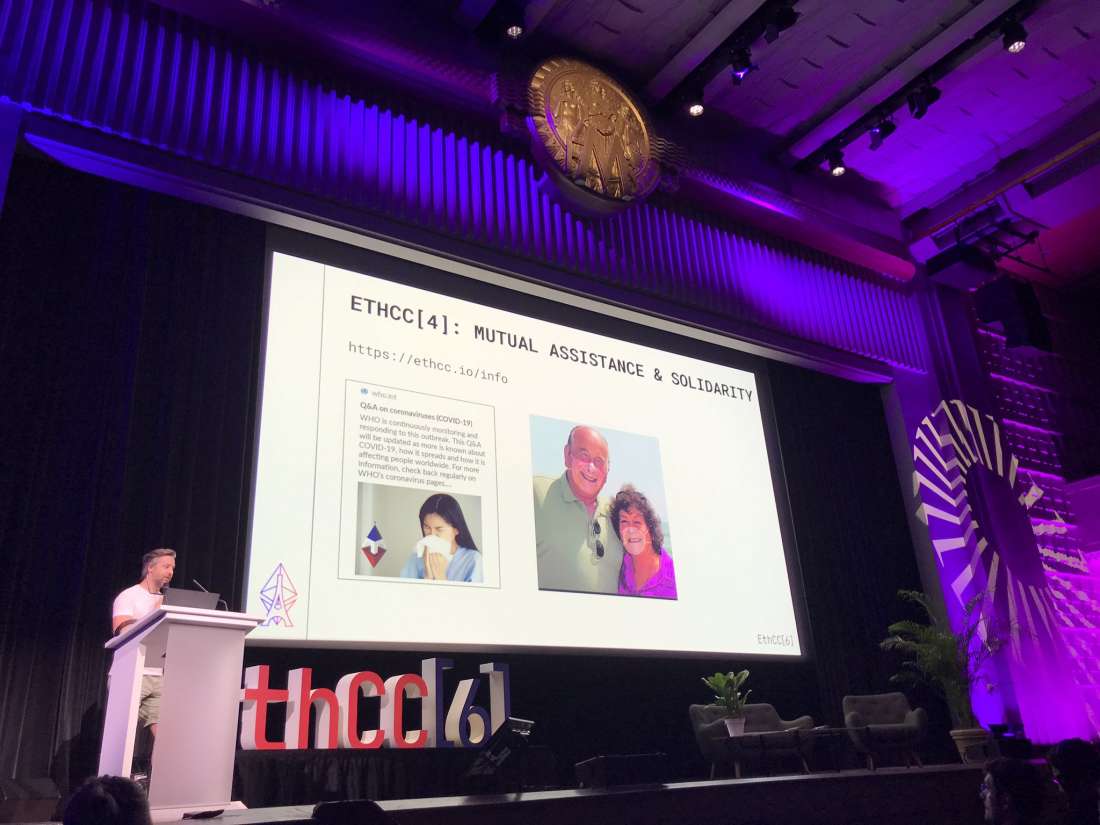
Caption: Jerome De Tychey, President of Ethereum France, opening address for EthCC[6].
Source: Christine Kim
This year, temperatures in Paris were mild, ranging mostly between a cool 15 to 25 degrees Celsius. The city continues to boast extremely convenient and accessible public transportation, which made navigation between side events a breeze (and there were over 250 spread out across all parts of Paris this year). Overall, the organization and logistics of this week were some of the best I’ve seen from Ethereum conferences that I’ve attended over the years.
Aside from the conference experience, EthCC[6] was a Schelling point for Ethereum developers and enthusiasts to discuss a broad array of topics, including but not limited to:
Account abstraction
Zero-knowledge proofs
Maximal Extractable Value (MEV)
Public goods funding
Quantum computing
Decentralized finance (DeFi)
Blockchain gaming
Layer-2 rollups
Developer tooling
Web3 culture and governance
There were also several product announcements shared during EthCC[6], including but not limited to:
7/17 - Celo transitioning from a Layer-1 protocol to Layer-2 rollup,
7/17 - BitDAO’s Layer-2 protocol Mantle launches on mainnet,
7/17 - Uniswap Labs unveiling a new blockchain protocol “UniswapX” for cross-chain swaps,
7/17 - Decentralized social networking app Lens Protocol unveils plans for V2,
7/17 - Gnosis launches Visa card to pay with self-custodied cryptocurrency,
7/17 - Chainlink’s interoperability protocol launches on Avalanche, Ethereum, Optimism, and Polygon,
7/17 - Nil Foundation and Fabric Cryptography partner to collaborate on ZK proofs,
7/18 - Espresso Systems and EigenLayer announce ecosystem partnership,
7/19 - Nethermind partners with EigenLayer to expand restaking capabilities,
7/19 - Starknet unveils Appchains
7/19 - Consensys’ Layer-2 protocol Linea launches on mainnet,
7/19 - Stakewise launches public V3 test network,
7/20 - Consensys’ Metamask team shares details on rollout plan this year for Snaps feature.
The Elephant in the Room
Based on the wide-ranging discussions and announcements that occurred over the span of four days at EthCC[6], progress is being made in seemingly every facet of Ethereum development, from the core protocol-layer and beyond, by a wide array of ecosystem participants and stakeholders. Particularly on the topic of account abstraction, which up until recent months has struggled to garner widespread attention in the Ethereum community, EthCC[6] hosted focused workshops, keynotes, and debates featuring prominent wallet developers from the likes of Ledger, Safe, and Argent, as well as core developers from the Ethereum Foundation. For more information about what account abstraction is, listen to Vitalik Buterin’s keynote presentation at EthCC[6].
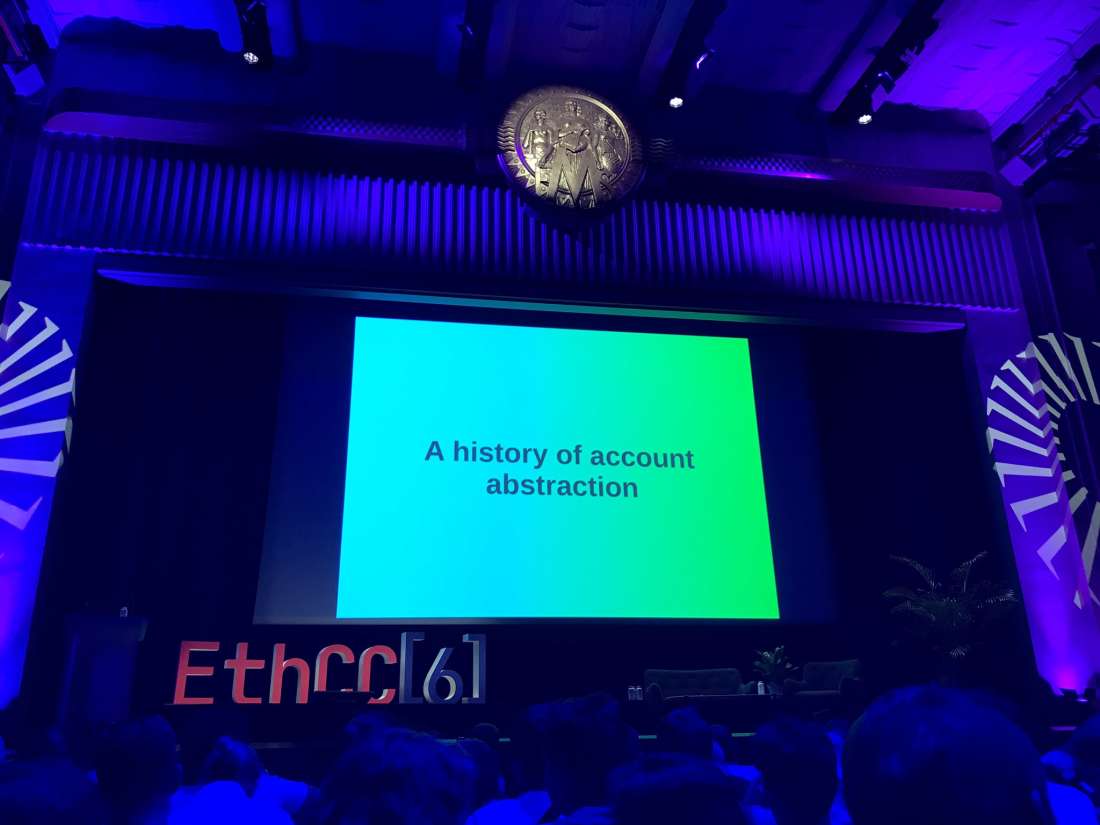
Caption: Vitalik Buterin’s keynote presentation on account abstraction at EthCC[6].
Source: Christine Kim
I would argue that more than the incremental technological progress being made on initiatives like account abstraction, enshrined PBS, zero-knowledge proofs, among others, the most important discussion that was had at EthCC[6] was around protocol governance. Whether regarding the governance of Ethereum’s core protocol, liquid staking and staking services, Layer-2 sequencers, or MEV relays, the most important questions being asked were about the long-term sustainability of existing consensus mechanisms and social norms to govern an expanding web of decentralized technologies and the need for new solutions to address competing stakeholder intents.
The central ethos and goal of the crypto movement is to build permissionless, decentralized, and censorship-resistant protocols that uphold core principles such as “code is law” and “can’t be evil.” In practice, however, there have been challenges in upholding these principles and protocols have to balance designs that are immutable with the potential advantages of upgradeability. The degree to which these principles are upheld is relative rather than binary. But this tension is also precisely why the topic of governance—defined as the means and processes through which Web3 technologies can evolve into becoming more resilient, permissionless, decentralized, and censorship-resistant over time—is usually riddled with controversy and confusion, and so urgent.
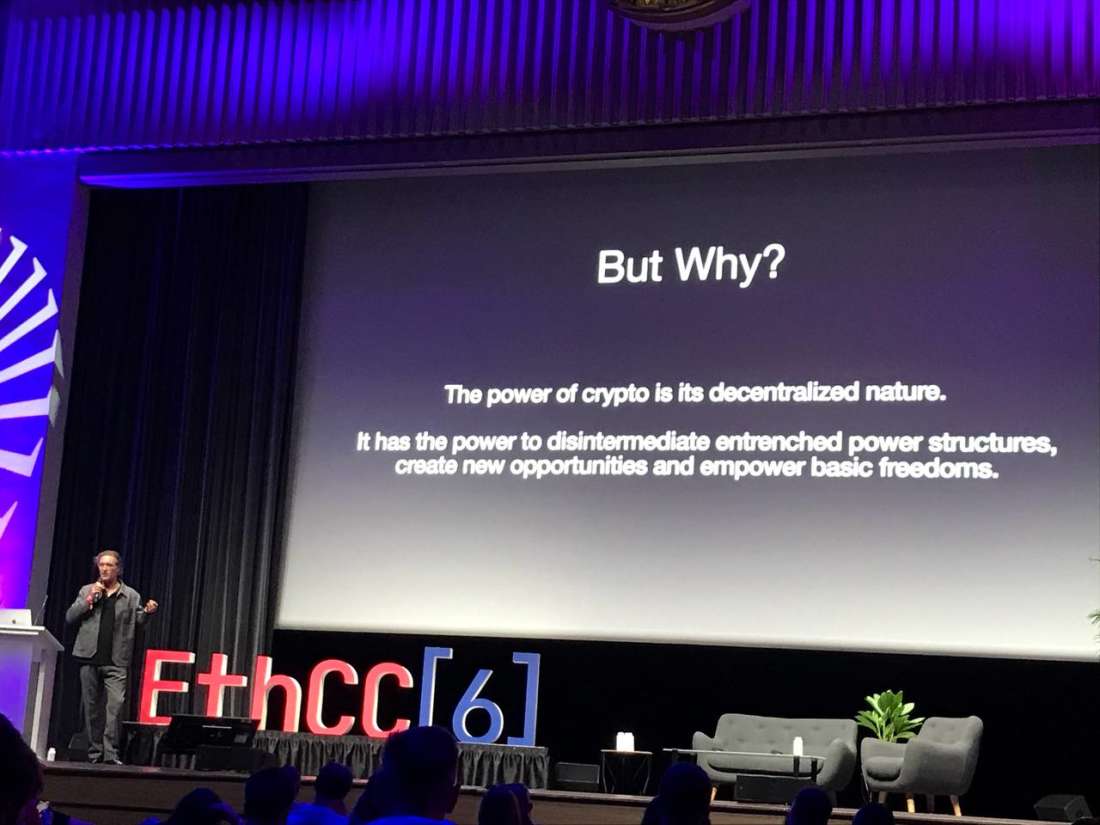
Caption: Dr. Steven Waterhouse’s keynote presentation on crypto vs the state at EthCC[6].
Source: Christine Kim
Scaling Blockchains and Governance
At EthCC[6], several presentations explicitly focused on the complexities of protocol governance. On Day 1, the Ethereum Foundation’s Tim Beiko, who facilitates bi-weekly Ethereum core developers calls, shared a detailed overview on the mainstage of how code changes to Ethereum happen. His explanation highlighted the amorphous and ever-evolving nature of Ethereum governance. In response to a question from the audience about how community support and pushback is measured in the Ethereum core protocol governance process, Beiko frankly stated, “No single way. It changes every time.” On Day 2, Vitalik Buterin’s talk on the history of account abstraction (AA) highlighted that competing priorities and interests of various Ethereum stakeholders, most importantly ETH holders and core developers, have shaped the progress and lack thereof on AA since the genesis of Ethereum.
Aside from conversations about the governance of the Ethereum protocol at EthCC[6], governance was also a central theme underlying various side events throughout the week. Popular topics at side events included: how to decentralize Layer-2 sequencers, advance designs for untrusted relays, and shepherd the evolution of liquid staking and restaking protocols like Lido and EigenLayer, respectively. The Modular Summit, organized by Celestia Labs and hosted the weekend after the end of EthCC[6], featured prominent developers across the Ethereum, Cosmos, and Celestia communities.
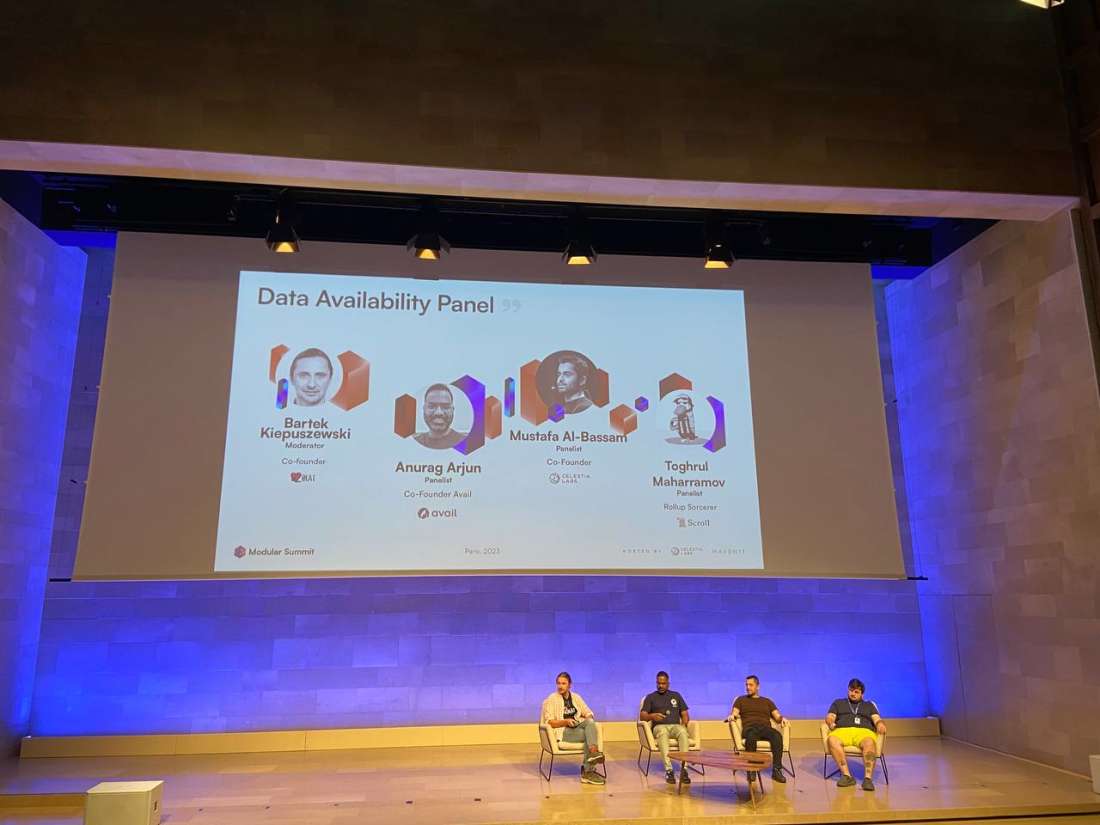
Caption: Data availability panel at Modular Summit 2023.
Source: Christine Kim
As each rapidly advances towards modularism though network upgrades (whether Ethereum’s upcoming Dencun upgrade, Celestia’s forthcoming mainnet launch, and Cosmos’s journey to more robust interchain security features), the tradeoffs between different consensus mechanisms for securing decentralized protocols are at the top of developers’ minds. Particularly urgent topics on this front include light client development, sequencer-prover separation, and competition between a multiplicity of data availability (DA) layers.
Whether implicitly or explicitly, the need for resilient governance mechanisms to secure protocols like Ethereum and the layers built atop it drove conversations around cryptography, community-building, and application development at EthCC[6] and its side events. Governance has always been a major topic for the Ethereum community and the crypto industry in general, but the completion of the Merge and the still-more ambitious upgrades to Ethereum yet to be implemented are catalyzing renewed technical and social discussions on the topic. Determining paths forward for sustainable governance mechanisms that can scale as a decentralized protocol scales is a work-in-process for many protocols, but it was clear at EthCC[6] that headway is being made.
Legal Disclosure:
This document, and the information contained herein, has been provided to you by Galaxy Digital Holdings LP and its affiliates (“Galaxy Digital”) solely for informational purposes. This document may not be reproduced or redistributed in whole or in part, in any format, without the express written approval of Galaxy Digital. Neither the information, nor any opinion contained in this document, constitutes an offer to buy or sell, or a solicitation of an offer to buy or sell, any advisory services, securities, futures, options or other financial instruments or to participate in any advisory services or trading strategy. Nothing contained in this document constitutes investment, legal or tax advice or is an endorsementof any of the digital assets or companies mentioned herein. You should make your own investigations and evaluations of the information herein. Any decisions based on information contained in this document are the sole responsibility of the reader. Certain statements in this document reflect Galaxy Digital’s views, estimates, opinions or predictions (which may be based on proprietary models and assumptions, including, in particular, Galaxy Digital’s views on the current and future market for certain digital assets), and there is no guarantee that these views, estimates, opinions or predictions are currently accurate or that they will be ultimately realized. To the extent these assumptions or models are not correct or circumstances change, the actual performance may vary substantially from, and be less than, the estimates included herein. None of Galaxy Digital nor any of its affiliates, shareholders, partners, members, directors, officers, management, employees or representatives makes any representation or warranty, express or implied, as to the accuracy or completeness of any of the information or any other information (whether communicated in written or oral form) transmitted or made available to you. Each of the aforementioned parties expressly disclaims any and all liability relating to or resulting from the use of this information. Certain information contained herein (including financial information) has been obtained from published and non-published sources. Such information has not been independently verified by Galaxy Digital and, Galaxy Digital, does not assume responsibility for the accuracy of such information. Affiliates of Galaxy Digital may have owned or may own investments in some of the digital assets and protocols discussed in this document. Except where otherwise indicated, the information in this document is based on matters as they exist as of the date of preparation and not as of any future date, and will not be updated or otherwise revised to reflect information that subsequently becomes available, or circumstances existing or changes occurring after the date hereof. This document provides links to other Websites that we think might be of interest to you. Please note that when you click on one of these links, you may be moving to a provider’s website that is not associated with Galaxy Digital. These linked sites and their providers are not controlled by us, and we are not responsible for the contents or the proper operation of any linked site. The inclusion of any link does not imply our endorsement or our adoption of the statements therein. We encourage you to read the terms of use and privacy statements of these linked sites as their policies may differ from ours. The foregoing does not constitute a “research report” as defined by FINRA Rule 2241 or a “debt research report” as defined by FINRA Rule 2242 and was not prepared by Galaxy Digital Partners LLC. For all inquiries, please email [email protected]. ©Copyright Galaxy Digital Holdings LP 2023. All rights reserved.



